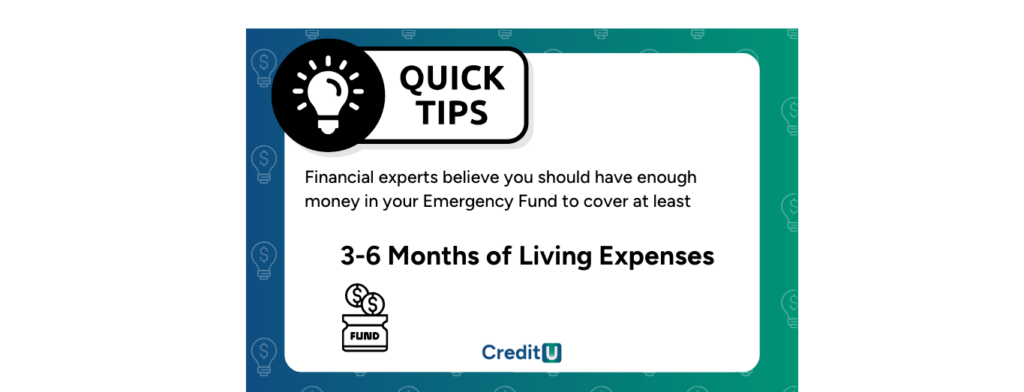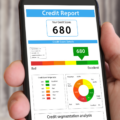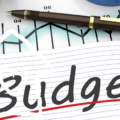Getting Financially Organized
July 6, 2023
Managing your finances may seem like a daunting task. For many, the intricate web of income, expenses, savings, and investments can be challenging to navigate. However, with a clear plan and organizational skills, you can make your financial journey smooth and straightforward. Staying financially organized helps you to meet your goals, reduce stress, and make informed decisions about your future. Here’s a step-by-step guide to help you achieve financial clarity. Let’s delve into a comprehensive step-by-step guide crafted to illuminate the path to financial clarity and mastery.
Topics Covered: Start with Clear Financial Goals Regularly Track and Review Your Expenses Set a Budget and Stick with It Go Digital Create an Emergency Fund Stay on Top of the Credit Report Stay Informed Organize Financial Documents What Can CreditU Do For You? Key insights – Staying Financially Organized
1- Start with Clear Financial Goals to Stay Financially Organized:
Before you can organize your finances, you must understand what you’re working towards. Whether it’s buying a home, retiring early, or simply saving for a rainy day, define your financial goals clearly. Write them down, and make sure they are specific, measurable, and time bound.
It is all about anchoring yourself to a clear purpose. You need well-defined financial goals to direct your money decisions. Clarity in goals will take you in the right direction and curtail any unnecessary expenditure.
Here are some examples of clearly defined financial goals.
Buying a Home: Instead of having a vague goal like “I want to buy a house someday”, refine it to be more specific: “I aim to save $80,000 for a down payment on a 3-bedroom house in the next five years.”
Retiring Early: Instead of just dreaming about early retirement, set a clear target. “I wish to retire by 50 with $1 million in savings” gives you a quantifiable goal to strive for.
Saving for Contingencies: Rather than merely saving for a “rainy day”, determine a concrete amount. “I want to have $15,000 in an emergency fund within the next two years” is a more focused and actionable objective.
Once you’ve identified these goals, document them. Physically writing down goals has been shown to increase commitment and accountability. It is important that you make sure each goal is:
Specific: Clearly outline what you’re aiming for.
Measurable: Assign a specific number or metric to it.
Time-Bound: Set a deadline or timeframe for achieving the goal.
By establishing such concrete financial milestones, you not only set the stage for effective planning but also motivate yourself to stay on track and achieve them. This is the first and most important step to organizing your finances. Look for short, medium and long term financial goals to enhance the precision of your money management plan.
2-Regularly Track and Review Your Expenses
To know where your money is going, keep a record of all your expenses. There are several apps and tools available that can help you categorize and monitor your spending. Reviewing this regularly helps you identify unnecessary expenses and adjust your spending habits.
Methods of Tracking Expenses:
-
- Traditional Paper and Pen: While it may sound old-school, maintaining a daily ledger of your expenses can be effective. By writing down every penny spent, from that morning coffee to monthly rent, you get an immediate visual representation of your spending patterns.
- Digital Tools and Apps: In today’s tech-driven era, several apps and online tools can automate the expense-tracking process. For instance, apps like CreditU directly links with your bank account and can help you categorize your expenditures, offering real-time updates and monthly summaries.
- Excel or Spreadsheet Software: Create a custom monthly or weekly budget spreadsheet. Dedicate columns for different expense categories, such as groceries, entertainment, utilities, and transportation. As you spend, update the spreadsheet to reflect the amounts.
Benefits of Regular Review:
Spotting Unnecessary Expenditures: By assessing your expenses, you might realize that you’re spending a significant amount on dining out, prompting you to consider cooking at home more often.
Identifying Patterns: Maybe you’ll notice that your utility bills spike in December due to increased heating. Recognizing such patterns can help you budget for those expected increases or consider energy-saving alternatives.
Adjusting Spending Habits: If, for example, you observe that your monthly subscription services (like streaming platforms or magazines) are piling up and going unused, it might be time to reconsider which ones are truly essential.
A routine review of expenses not only illuminates where your money is going but also equips you with the knowledge to refine your spending habits, ensuring alignment with your financial goals.
3-Set a Budget and Stick to It:
Once you have a clear picture of your expenses, create a budget. Allocate specific amounts to necessities like rent, groceries, utilities, and savings. Remember, a budget only works if you stick to it, so make sure it’s realistic.
Categorize Your Expenses: Begin by categorizing your costs into fixed and variable expenses.
Fixed Expenses: These are costs that remain consistent month-to-month. Examples include:
Rent/Mortgage: If you’re paying $1,200 monthly for your apartment, this amount goes under fixed expenses.
Insurance Premiums: Whether it’s health, car, or home insurance, the consistent monthly amount should be listed here.
Variable Expenses: These are expenses that might change each month based on your usage or choices. Examples include:
Groceries: While you might spend $300 on groceries one-month, festive seasons or special occasions might push this to $400 the next.
Utilities: Electric, water, and gas bills can fluctuate depending on usage and seasons.
Allocate Funds for Savings: It’s crucial to treat savings as a non-negotiable expense. Decide on a percentage of your income (for instance, 20%) to set aside each month. This ensures you’re building a financial cushion for the future.
Make Your Budget Flexible Yet Realistic: While it’s essential to be strict with your budget, ensure it’s flexible enough to account for unexpected expenses. If you’ve budgeted $200 for dining out and an unexpected dinner invitation arises, having a miscellaneous or contingency category can help.
Review and Adjust Regularly: Your financial situation and priorities might evolve. Maybe you got a raise, or perhaps you’ve welcomed a new member to the family. Regularly (like monthly or quarterly) revisiting your budget ensures it remains relevant to your current circumstances.
Stay Committed: While setting a budget is an achievement, the real challenge lies in adhering to it. This requires discipline, foresight, and sometimes, a bit of sacrifice. For instance, if you’ve exhausted your entertainment budget for the month, consider hosting a movie night at home instead of going to the theater.
A good rule of thumb to work with is the 50-30-20 rule when it comes to budgeting. This way you allocate most of your income towards your needs, (50%), then towards your wants (30%) and a balance towards your debt and savings (20%). This strategy provides you with a broader strategy to effectively manage your money.
In essence, the effectiveness of a budget isn’t just in its creation but in its consistent application. A realistic, well-structured budget acts as a roadmap, steering you towards financial stability and growth.
4-Go Digital:
Switching to digital payments and online banking can simplify your financial life. Automated payments ensure you never miss a bill, and online statements provide a quick overview of your finances whenever you need it.
Digital Payments: Gone are the days of writing checks or standing in long queues to pay bills. With digital payment platforms like PayPal, Venmo, or your bank’s own mobile app, you can effortlessly transfer money, pay bills, or even split dinner costs with friends.
Automated Bill Payments: Setting up automatic payments for recurring bills, like your electricity or Netflix subscription, ensures you never incur late fees. Imagine not having to remember every due date; instead, your credit card or bank account is automatically debited.
Online Banking Benefits: Modern online banking platforms are feature rich. They often include:
Instant Access: Check balances, make transfers, or view transaction histories in real-time, from anywhere.
Alerts and Notifications: Set up alerts for low balances, large transactions, or upcoming bill due dates. For example, Chase Bank sends real-time notifications for any significant account activity, ensuring you’re always in the loop.
Budgeting and Tracking Tools: Many banks now offer built-in budgeting tools that categorize your spending. Tools like CreditU can even sync with your bank accounts, providing insights into spending habits and offering personalized savings advice.
Digital Documentation: Instead of hoarding paper statements, choose e-statements. They’re not only environmentally friendly but also easily searchable. Need to find a transaction from eight months ago? Instead of sifting through piles of paper, a simple keyword search in your email or banking portal can retrieve it instantly.
By harnessing the power of digital tools and platforms, you not only simplify your financial life but also gain better control, clarity, and efficiency in managing your finances.
5-Create an Emergency Fund:
Life is unpredictable. An emergency fund acts as a financial cushion for unexpected events such as medical emergencies, car repairs, or job loss. Aim to save at least three to six months’ worth of living expenses.

For instance, imagine being faced with a sudden medical procedure that your insurance doesn’t fully cover. Instead of relying on high-interest credit cards or loans, an emergency fund can cover at least a portion of these costs without derailing your financial stability.
In more severe cases, like a sudden job loss, having a cushion can be even more crucial. It might take a few months to find a new position that aligns with your skills and career aspirations. During this period, an emergency fund can cover your essential expenses like rent, groceries, and utilities, allowing you to focus on your job search without the added stress of financial constraints.
An emergency fund provides ample buffer time and resources to navigate through most of life’s unexpected challenges without jeopardizing your financial health.
6-Regularly Check Your Credit Report:
Your credit report plays a crucial role in your financial health. It affects loan approvals, interest rates, and your overall financial health. Ensure you check your credit report annually for discrepancies and understand your credit score.
Why it’s Important:
Loan Approvals: Lenders examine your credit report to assess the risk of lending you money. A positive report can be the deciding factor in obtaining a mortgage for your dream home or securing an auto loan for that new car you’ve been eyeing.
Example: Imagine you want to buy a house. A stellar credit report could be the difference between being approved for a $300,000 mortgage at a 3% interest rate versus a $250,000 mortgage at a 5% rate.
Interest Rates: A healthier credit score often translates to lower interest rates, meaning you’ll pay less overtime when borrowing money.
Example: On a 5-year, $20,000 car loan, an interest rate drops from 8% to 4% due to a better credit score could save you over $2,000 in interest payments.
To safeguard your financial reputation and to ensure that you’re not penalized for errors or fraud, it’s important to review your credit report at least once a year. Platforms like AnnualCreditReport.com in the U.S. allow you to access your credit report from the three major credit bureaus for free once a year. If you spot any inaccuracies, take steps to address and rectify them promptly. Familiarize yourself with your credit score, understand its components, and work on strategies to enhance it.
7-Stay Informed:
The financial world is ever evolving. From changes in tax laws to new investment opportunities, stay informed. Subscribe to financial news, read books, or consult with a financial advisor to keep your knowledge updated.
Tax Laws: Governments regularly revise tax regulations. There may be significant changes to tax brackets, deductions, and credits, affecting both individuals and businesses. Staying updated ensures you maximize your deductions and remain compliant.
Investment Opportunities: The rise of cryptocurrencies like Bitcoin and Ethereum introduced a new asset class for potential investors. Those who were informed early on had the chance to capitalize on significant gains.
Economic Trends: Understanding global economic indicators, like shifts in the job market or inflation rates, can influence decisions on savings, investments, and major purchases. For instance, a strong job market might signal a good time to invest in equities, while rising inflation could impact the real return on certain investments.
To stay on top of these changes you can:
Subscribe to Financial News: Platforms like Bloomberg, CNBC, or the Financial Times offer timely updates on global financial news. Set up news alerts for topics that pertain directly to your interests and investments.
Consult with a Financial Advisor: A professional can offer personalized advice tailored to your financial situation, helping you adapt to changes and seize new opportunities. They can also clarify complex topics and offer guidance on planning for the future.
8-Organize Financial Documents:
Even in the digital age, some financial documents need to be kept in hard copy. Create a system to file important documents such as tax returns, insurance policies, and property deeds. Regularly review and discard outdated documents.
Categorize Your Documents: Start by categorizing your documents. For instance:
Tax Documentation: This would include your annual tax returns, W-2s or 1099s, and any documentation related to deductions you’ve claimed.
Insurance: This could span from your home and auto insurance policies to health and life insurance details.
Real Estate and Other Assets: Property deeds, car titles, and other asset ownership papers should be grouped together.
Use a Filing Cabinet: Invest in a sturdy filing cabinet. Within it, use labeled folders or dividers for each category to simplify retrieval. For instance, you could have separate folders for “2022 Tax Returns”, “Home Insurance”, and “Vehicle Title”.
Set a Review Schedule: As years go by, certain documents like outdated insurance policies or tax documents older than seven years may no longer be necessary. Set a yearly reminder to go through your files and safely discard or shred documents that are no longer needed. For example, if you’re beyond the point where an old tax return is required for auditing purposes, it might be time to dispose of it.
Safekeeping: For exceptionally important documents like wills, property deeds, or birth certificates, consider keeping them in a fireproof safe or a safety deposit box at your bank. This provides an added layer of protection against potential mishaps at home.
What Can CreditU Do For You?
CreditU is a personal finance app that can help you stay financially organized in a number of ways. It can help you track your expenses by linking your bank accounts and credit cards to the app. Set and track financial goals within the app. CreditU can also help you create a budget and stick to it. You can input expenses for different categories, such as groceries, transportation, or entertainment. This can help you avoid overspending and ensure that you are putting your money towards your financial goals.
CreditU also offers a range of other features to help you stay financially organized, such as credit score monitoring and personalized financial education. By using these tools, you can gain a better understanding of your finances and make informed decisions about how to manage your money.
CreditU can help you stay financially organized by providing you with a comprehensive view of your finances and offering tools to help you manage your money effectively. Whether you are looking to get out of debt, save for a big purchase, or just get a better handle on your finances, CreditU can be a valuable tool to help you achieve your goals.
Key Insights: Staying Financially Organized
1. Financial organization isn’t just about neatness; it’s about efficiency, clarity, and empowerment.
2. When you know where every penny goes, when every bill is due, and how your investments are performing, you can make decisions with confidence.
3. Start implementing these steps today and take control of your financial future.
Last Updated on January 11, 2024 by Dilini Dias Dahanayake







